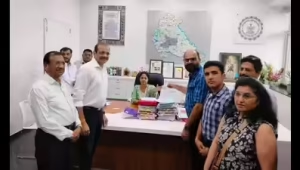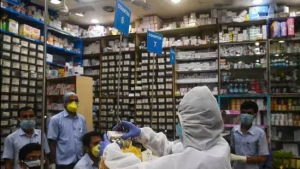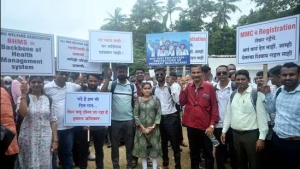CCMP homoeopathic doctors
Over 9,000 CCMP homoeopathic doctors across Maharashtra have ended their hunger strike after the state government promised a comprehensive review of the registration suspension that had sparked widespread protests. The hunger strike, which began on July 16 at Azad Maidan in Mumbai, represented one of the largest organised protests by alternative medicine practitioners in the state’s history. The CCMP homoeopathic doctors’ demonstration highlighted critical issues surrounding healthcare policy and the integration of different medical systems.
The protest by CCMP homoeopathic doctors was triggered by the sudden suspension of their registration rights, which had been granted under the Certificate Course in Modern Pharmacology program. This suspension came after the Indian Medical Association (IMA) raised strong objections to allowing homoeopathic practitioners to practice modern medicine, creating a significant conflict between different medical communities.
The Certificate Course in Modern Pharmacology (CCMP) program was designed to bridge the gap between traditional homoeopathic practice and modern medical treatment. CCMP homoeopathic doctors undergo specialised training that qualifies them to prescribe allopathic medicines and practice modern medicine techniques alongside their traditional homoeopathic knowledge. This integration was intended to address healthcare accessibility issues, particularly in underserved areas where qualified allopathic doctors are scarce.
The program for CCMP homoeopathic doctors represented a significant policy shift in Maharashtra’s healthcare landscape. The initiative allowed homoeopathy practitioners to practice allopathy after completing the Certificate Course in Modern Pharmacology, marking a progressive approach to healthcare integration that other states were closely monitoring.
The controversy surrounding CCMP homoeopathic doctors began when the Maharashtra Medical Council (MMC) initially allowed qualified practitioners to register and practice modern medicine. The MMC had issued a notification on June 30, 2025, allowing CCMP-qualified doctors to register with the Council, but this decision faced immediate opposition from the medical establishment.
The Indian Medical Association strongly contested the registration of CCMP homoeopathic doctors, arguing that allowing homoeopathic practitioners to practice allopathy could compromise patient safety. The IMA met Chief Minister Devendra Fadnavis on Thursday, leading to the temporary stay on the earlier order, demonstrating the significant political pressure that influenced the government’s decision.
Recognising the severity of the situation, the Maharashtra government took decisive action to address the concerns of CCMP homoeopathic doctors. The state government formed a seven-member expert committee to address the growing unrest, signalling its commitment to finding a balanced solution that considers all stakeholders’ interests.
The expert committee’s formation represents a crucial development for CCMP homoeopathic doctors, as it provides an institutional framework for reviewing the policy. Until the committee submits its report, no new registrations under the CCMP route will be allowed, creating a temporary but significant pause in the program’s implementation.
The protest by CCMP homoeopathic doctors highlighted broader issues related to healthcare accessibility in Maharashtra. Many rural and underserved areas depend on alternative medicine practitioners to provide basic healthcare services, and the integration of modern pharmacology training was seen as a way to enhance these services without compromising traditional practices.
The suspension of registrations for CCMP homoeopathic doctors potentially affects healthcare delivery in areas where qualified allopathic doctors are unavailable. This situation demonstrates the complex balance between maintaining medical standards and ensuring healthcare accessibility, particularly in regions where medical infrastructure remains inadequate.
The hunger strike by CCMP homoeopathic doctors exposed significant tensions within Maharashtra’s healthcare policy framework. The government’s initial support for the program, followed by its suspension under pressure from the IMA, revealed the challenges of implementing integrated healthcare policies in a politically sensitive environment.
The resolution of the protest through government promises of review suggests that CCMP homoeopathic doctors have achieved at least temporary success in drawing attention to their concerns. However, the long-term outcome will depend on the expert committee’s findings and the government’s willingness to implement balanced policies that address all stakeholders’ concerns.
 The debate surrounding CCMP homoeopathic doctors involves fundamental questions about professional standards and patient safety in integrated healthcare systems. Supporters argue that the additional training ensures competency in modern pharmacology, while critics worry about potential gaps in medical education and clinical experience.
The debate surrounding CCMP homoeopathic doctors involves fundamental questions about professional standards and patient safety in integrated healthcare systems. Supporters argue that the additional training ensures competency in modern pharmacology, while critics worry about potential gaps in medical education and clinical experience.
During meetings, the state government expressed concerns raised by the IMA over allowing homoeopathic doctors to practice modern medicine, with assurances that CCMP-qualified practitioners are competent and there would be no compromise on patient safety, highlighting the ongoing tension between different medical perspectives.
The resolution of the hunger strike marks a significant milestone for CCMP homoeopathic doctors, but the outcome depends on the expert committee’s recommendations. The committee’s findings will likely influence not only Maharashtra’s healthcare policy but also serve as a precedent for other states considering similar integration programs.
The protest has established CCMP homoeopathic doctors as a significant voice in healthcare policy discussions, demonstrating their capacity for organized advocacy and their commitment to expanding their practice rights. This activism may influence future policies regarding alternative medicine integration and professional recognition.
 The end of the hunger strike represents a temporary victory for CCMP homoeopathic doctors, achieved through sustained collective action and public pressure. However, the ultimate success of their cause depends on the expert committee’s findings and the government’s subsequent policy decisions. The protest has highlighted the need for clearer policies regarding healthcare integration and the role of alternative medicine practitioners in modern healthcare delivery.
The end of the hunger strike represents a temporary victory for CCMP homoeopathic doctors, achieved through sustained collective action and public pressure. However, the ultimate success of their cause depends on the expert committee’s findings and the government’s subsequent policy decisions. The protest has highlighted the need for clearer policies regarding healthcare integration and the role of alternative medicine practitioners in modern healthcare delivery.
The resolution demonstrates that organised professional advocacy can influence government policy, but it also underscores the ongoing challenges faced by CCMP homoeopathic doctors in achieving full recognition and practice rights. The next phase will be crucial in determining whether this temporary success translates into lasting policy changes that support integrated healthcare delivery in Maharashtra.


